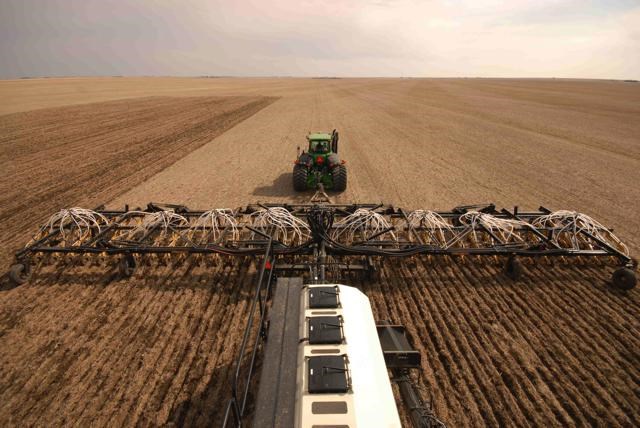Moisture conditions are great for seeding, and Creelman-area farmer Marcel Van Staveren began this spring’s seeding on Tuesday.
Some farmers reported starting on their planting already, but Van Staveren and his two brothers waited until Tuesday to get their seeders out into the fields, in spite of the wet snow received over the weekend.
“We didn’t get a lot, about two inches of snow or five millimetres of actual water,” said Van Staveren on Monday afternoon.
In terms of soil moisture, he said their fields are way ahead of last year when they began seeding with 48 inches of dry soil. This year they have moisture in the top two feet of soil, which is “a reasonable amount of moisture”.
“We’re not out of the woods for moisture, as we’ll need more in the spring, but year over year, I’m quite happy to be going in this,” he added, noting that most dugouts in the Fillmore-Creelman area are full, which will be good for the area’s livestock producers.
The biggest concern for the producer are the grain markets, in particular for canola and pulse crops like lentils and peas.
With China not buying Canadian canola, this will have a major effect on the canola market, but in Van Staveren’s mind, this won’t be enough to change his mind about seeding canola this spring.
Most farmers who normally seed canola will still be planting the crop, “because farmers by nature are eternal optimists,” and will be hoping for some resolution to come this year in their trade with China.
“Hopefully the trade barriers will be softened, and-or there will be new markets. I hoping there will be a change in the situation,” said Van Staveren.
He has a concern that there aren’t any delegations to China being arranged yet to go and talk to their government about the trade issues, since that country buys about 40 per cent of the canola produced here.
“That’s a dollar a bushel less of potential income,” he said. “It almost makes canola a break-even proposition. Historically, 50 per cent of most grain farm profits come from canola.”
He pointed out that one of the major users of canola meal in China are hog producers, who are being impacted by the African swine flu currently, so this has softened demand somewhat for canola meal.
The other major headache affecting markets are the tariffs imposed by India for the second year on lentils, peas and chickpeas.
“Usually at this time of year, our big concern is getting a good start to our crops,” said Van Staveren.
He feels that acres seeded to canola will be decreased in some areas in Western Canada, but for the most part in southern Saskatchewan, canola acres will remain close to the same number.
“We don’t push the rotation of crops as heavily as they do in the Edmonton area or at Prince Albert. Canola acres will be down slightly, but not in southern Saskatchewan, in my opinion,” he said.



